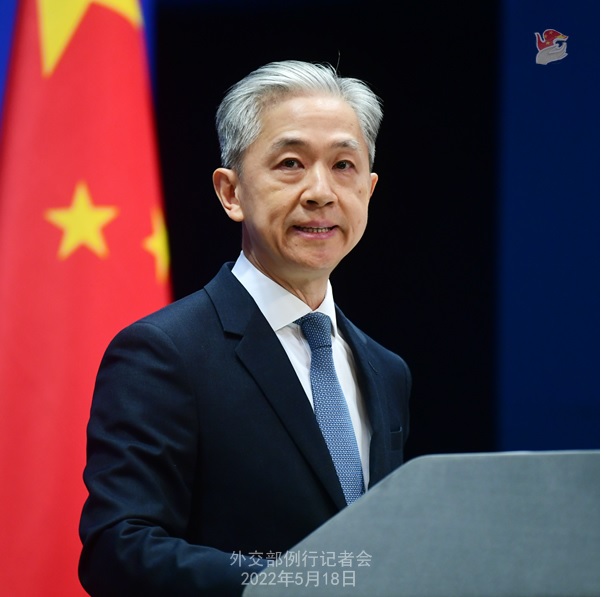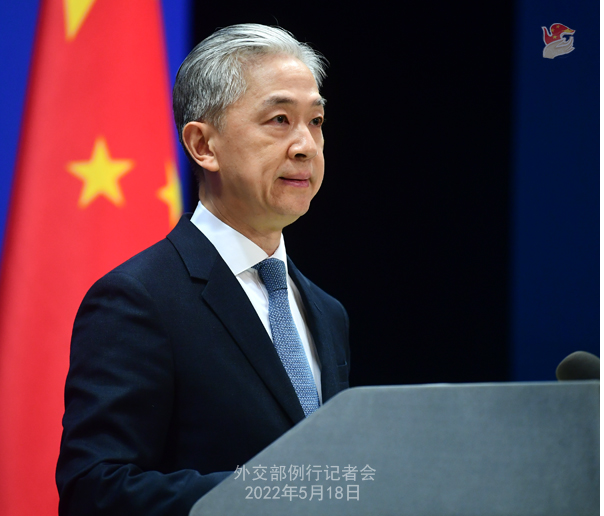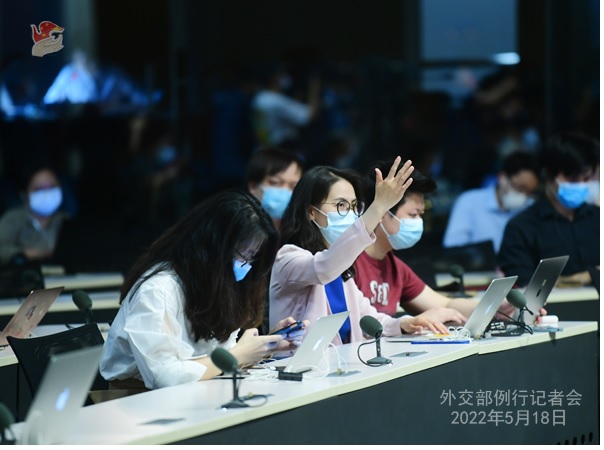Chinese Foreign Officer Presser May 18

China’s Foreign Ministry Spokesperson Wang Wenbin held a press conference on May 18 to put across Beijing view point on a host of issues.
Some Excerpts

Phoenix TV: According to media reports, on May 17 local time, more than 250 Ukrainian fighters walked out of their barricade at the Azovstal steel factory and surrendered, which symbolizes the end to the fiercest siege battle since the beginning of fighting between Russia and Ukraine. What is the Chinese side’s comment on this?
Wang Wenbin: China’s position on the Ukraine issue is consistent and clear. We hope the conflict will come to an end as soon as possible, and support Russia and Ukraine in properly resolving relevant issues through negotiation and consultation.
CCTV: Can you share China’s expectation of the virtual conference of BRICS foreign ministers’ meeting?
Wang Wenbin: BRICS is a cooperation mechanism of emerging markets and developing countries with global influence. In the face of the once-in-a-century pandemic and changes, the BRICS mechanism is of special and important significance for deepening cooperation among emerging markets and developing countries, and promoting post-COVID world economic recovery.
During China’s chairship of BRICS in 2017, President Xi Jinping proposed the idea of holding the foreign ministers’ meeting of BRICS countries. Under the strategic leadership of BRICS leaders, the foreign ministers’ meetings have played an important role in strengthening political mutual trust and deepening political security cooperation among the five BRICS countries. As the BRICS chair for 2022, China looks forward to enhancing communication and coordination with fellow BRICS partners on the new features and challenges of the current international situation and major international and regional issues. We will send a clear message of BRICS countries working together in solidarity, upholding true multilateralism, staying united in fighting COVID-19, and promoting peace and development. More importantly, we will make good preparations for the BRICS Summit.
Global Times: The Global Times just released results of two polls on perception of and attitude toward ASEAN among Chinese citizens and Chinese college students respectively. Do you have any comment?
Wang Wenbin: The results reflect the Chinese people’s friendly sentiment toward and positive impression of ASEAN nations, support for the development of good-neighbourly friendship between China and ASEAN, and confidence in the future of China-ASEAN relations. ….. .
The polls indicate that the Chinese public fully recognizes ASEAN’s positive contributions to peace and stability in Asia-Pacific and is fully aware of certain non-regional forces’ deliberate attempts to disrupt China-ASEAN relations. ASEAN countries are not chess pieces in a geopolitical contest, but important chess players who will promote regional development and prosperity. Any move to revive opposing blocs or stoke division and confrontation in the region will find no support…….

Bloomberg: It has been almost two months since the China Eastern crash. Does China have any information to share about the incident?
Wang Wenbin: The Civil Aviation Administration of China?(CAAC)?has responded to this. You may refer to that. CAAC has said that it will maintain close communication with all parties participating in the investigation, conduct the investigation in a science-based, meticulous and orderly manner, and release the progress and other relevant information about the investigation in a timely and accurate fashion in accordance with the?Convention?on?International?Civil?Aviation?(CICA) and government information disclosure requirements. ……
CCTV: The 2022 American Business in China White Paper released by the American Chamber of Commerce in China?(AmCham?China) said that, “We remain opposed to any effort at outright decoupling of the US-China relationship”. It added that the US tariff exemption program for China should be expanded and the COVID-19 pandemic and pandemic response should not be politicized. AmCham China Chair said that “what has made China attractive to our member companies has been the country’s clear long-term strategic development goals, significant market opportunity, and a highly supportive and predictable business environment.” Do you have any comment?
Wang Wenbin: China-US economic and trade ties are mutually beneficial and win-win in nature. In a world of economic globalization, opening-up and integration represents an invincible historical trend. Attempts to build walls and decouple run counter to economic laws and market rules, and will harm others without benefiting oneself. I noticed that the White Paper shows US businesses’ firm opposition to any effort at outright decoupling of the US-China relationship as the costs of decoupling from losing trade and foreign investment benefits for both countries would be significant and are unlikely to generate clear winners. We hope the US will listen attentively to the sensible and pragmatic voice of US companies, meet China halfway in the spirit of mutual respect, peaceful coexistence and win-win cooperation, and bring bilateral relations back onto the right track of sound and steady development?as?soon?as?possible.
The White Paper noted that China is among the largest and fastest growing markets in the world, and constitutes an important market for US products and services. China’s market also has a robust R&D and innovation ecosystem, and many leading American companies generate a substantial portion of their revenue from the Chinese market. China is a key source and supplier of a vast number of products and components, often at lower cost and in larger scale than available elsewhere, which benefits US consumers. More than two thirds of the surveyed report China as one of their company’s top three investment priorities.
The White Paper also raised some suggestions. The Chinese side will take a close look at them. Looking ahead, the Chinese economy has strong resilience and ample potential, and the fundamentals sustaining its sound growth in the long run remain unchanged. China will continue to deepen reform and expand opening-up, create a market-oriented, law-based and internationalized business environment, and provide more opportunities for international businesses including US companies to operate and invest in China.
Bloomberg: US Treasury Secretary Janet Yellen said that Western democracies have become too vulnerable to countries that use their market positions as geopolitical leverage. And she also called for the US and Europe to coordinate their approach toward China after having united against Russia. What is the foreign ministry’s response to Yellen’s comments?
Wang Wenbin: The international community can see very clearly which country keeps talking about dealing with other countries from a position of strength and abuses its hegemonic status in economy, finance and technology as leverage to suppress and contain other countries and seek selfish geopolitical gains.
Peace, development and win-win cooperation is the trend of our times and the shared aspiration of people in all countries. Some in the US spend all their time on coercing allies to form small cliques aimed at containing China. Their moves run counter to the trend of the times, find no support, and will lead nowhere.
We urge the US to match its words with actions, earnestly act on the US leader’s statement that the US does not seek a new Cold War with China and that the revitalization of its alliances is not targeted at China, and do more things conducive to enhancing China-US mutual trust and cooperation as well as world peace and development.
AFP: UN High Commissioner for Human Rights Michelle Bachelet is set to arrive in China soon for a visit. Can you confirm this?
Wang Wenbin: China welcomes Ms. Michelle Bachelet, the United Nations High Commissioner for Human Rights, to visit China in May and take a trip to Xinjiang. We will release information on the visit in due course.
Bloomberg: The US’ top naval officer Admiral Michael Gilday said that Taiwan must protect itself against potential Chinese aggression through military deterrence that includes acquiring the right weapons and proper training. Does the foreign ministry have any comments about his remarks?
Wang Wenbin: The relevant remarks of the US side fly in the face of US commitment to China on the Taiwan question and constitute an interference in China’s internal affairs. China is firmly opposed to them.
The China-US Joint Communiqué on the Establishment of Diplomatic Relations and the August 17 Communiqué clearly noted that the United States of America recognizes the Government of the People’s Republic of China as the sole legal government of China, and it acknowledges the Chinese position that there is but one China and Taiwan is part of China. In the Shanghai Communiqué, the US side also declared that, “The United States acknowledges that all Chinese on either side of the Taiwan Strait maintain there is but one China and that Taiwan is a part of China. The United States Government does not challenge that position.” The US admits that Taiwan is part of China, but keeps talking about the mainland’s potential “aggression” of Taiwan. It says it doesn’t support the independence of Taiwan, but removed such expressions as “Taiwan is part of China” and “The United States does not support Taiwan independence” from the State Department’s website. Such self-contradictory moves only lead people to question the seriousness and efficacy of the US claim that it adheres to the one-China policy.
Those who break faith not only tarnish their own reputation, but will also pay the price for doing so. Breaking commitments on the Taiwan question will incur historical punishment. We urge the US to abide by the one-China principle and the three China-US joint communiqués and earnestly act on its statement of not supporting “Taiwan-independence”, to prevent severe damage to China-US ties and peace and stability across the Taiwan Strait.
Kyodo News: Japanese and Chinese foreign ministers had a video meeting, according to information from the Chinese foreign ministry. Can you share more details on that?
Wang Wenbin: As you said, State Councilor and Foreign Minister Wang Yi held a virtual meeting with Japanese Foreign Minister Yoshimasa Hayashi today.
State Councilor Wang Yi said that this year marks the 50th anniversary of the normalization of China-Japan diplomatic ties, which is an important milestone in the development of bilateral relations. Last year the leaders of the two countries reached important common understanding on building a China-Japan relationship in keeping with the times. The two sides should be guided by this consensus and take the 50th anniversary of the normalization of ties as an opportunity to cement the political foundation for bilateral relations, and safeguard, consolidate and deepen the hard-won friendship cultivated by our predecessors and the people of both countries.
State Councilor Wang Yi pointed out that the pressing task now is to do three things well. First, we need to steer bilateral relations in the right direction. The four political documents between China and Japan set the general direction of peace, friendship and cooperation and laid down a series of important principled consensus including the one that the two countries are cooperative partners and do not pose a threat to each other. They underpin the steady and sound development of China-Japan relations. The more complicated and challenging our relations become, the more we need to stay true to our original aspiration and unswervingly adhere to the principles and spirit enshrined in the four political documents. We should have a correct understanding of each other, actively engage in positive interactions, make good plans for the commemoration of the 50th anniversary of the normalization of diplomatic ties, strengthen exchanges and cooperation at all levels and in various fields, and foster a positive public opinion and social atmosphere. Second, we need to strengthen the impetus driving the bilateral relations forward. Economic and trade cooperation is the ballast and propeller of bilateral relations. China’s accelerated efforts to foster a new development paradigm with domestic circulation as the mainstay and domestic and international circulations reinforcing each other will provide more opportunities for Japan and the world at large. The two sides should tap the potential of cooperation, strengthen coordination and cooperation in digital economy, green and low-carbon development and climate change governance, in order to achieve win-win results at a higher level. Third, we need to remove disturbances in a timely manner. Recently, Japan’s negative moves on Taiwan and other issues concerning China’s core interests and major concerns have become increasingly visible. Some political forces have wantonly smeared and attacked China, severely undermining mutual trust and shaking the foundation of bilateral relations. The lessons of history should never be forgotten. The Japanese side should honor the commitments it has made, keep faith with China, prevent forces trying to undermine China-Japan relations from gaining ground, and work with China to maintain the achievements made over the past 50 years since the normalization of diplomatic ties.
Foreign Minister Hayashi said that Japan and China share extensive common interests and enjoy huge potential and broad prospects for cooperation. This year marks the 50th anniversary of the normalization of diplomatic relations between Japan and China. The two sides should develop constructive and stable bilateral relations in accordance with the important consensus reached by the leaders of the two countries. Japan is ready to work with China to remain true to the original aspiration of normalizing the diplomatic relationship, keep up candid communication, reduce misunderstanding and miscalculation, properly handle sensitive issues and enhance political mutual trust.
The two sides also exchanged views on regional and international issues of mutual interest and agreed to maintain communication. (ENDs)
https://www.mfa.gov.cn/eng/xwfw_665399/s2510_665401/202205/t20220518_10688532.html
-
Book Shelf
-
 Book Review
DESTINY OF A DYSFUNCTIONAL NUCLEAR STATE
Book Review
DESTINY OF A DYSFUNCTIONAL NUCLEAR STATE
- Book ReviewChina FO Presser Where is the fountainhead of jihad?
- Book ReviewNews Pak Syndrome bedevils Indo-Bangla ties
- Book Review Understanding Vedic Equality….: Book Review
- Book Review Buddhism Made Easy: Book Review
- Book ReviewNews Elegant Summary Of Krishnamurti’s teachings
- Book Review Review: Perspectives: The Timeless Way of Wisdom
- Book ReviewNews Rituals too a world of Rhythm
- Book Review Marx After Marxism
- Book Review John Updike’s Terrorist – a review
-
-
Recent Top Post
-
 CommentariesTop Story
India’s Migration Dilemma
CommentariesTop Story
India’s Migration Dilemma
-
 Commentaries
Crowd Management Blues
Commentaries
Crowd Management Blues
-
 Meher Baba SpeaksNews
Meher Baba Loved Them Too…
Meher Baba SpeaksNews
Meher Baba Loved Them Too…
- Commentaries Record Pentagon spending bill and America’s hidden nuclear rearmament
-
 CommentariesNews
Ides of trade between India and Pakistan
CommentariesNews
Ides of trade between India and Pakistan
-
 Commentaries
How sustainable is the rhetoric of India-China Bhai-Bhai
Commentaries
How sustainable is the rhetoric of India-China Bhai-Bhai
-
 CommentariesTop Story
New Set of Diplomatic Strains with Canada
CommentariesTop Story
New Set of Diplomatic Strains with Canada
-
 News
Ratan Tata’s Legacy
News
Ratan Tata’s Legacy
-
 Commentaries
India’s Strategic Push on the World Stage
Commentaries
India’s Strategic Push on the World Stage
- Commentaries Veils of Resistance
-
AdSense code
















